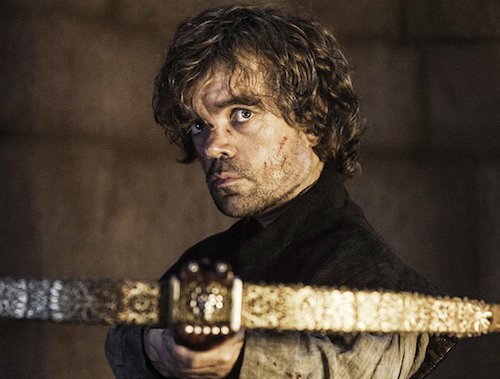And especially, Tyrion
Do you have a Kindle? What do you think of it? (We’re getting to Tyrion, really.)
I only use mine for travel, because I tend to forget, instantly, anything I read on it. Straight into the memory hole it goes. Am I alone in this? Reading on a Kindle doesn’t involve the physical acts of handling a book, feeling the quality of the paper on your fingers, noting the typeface. You don’t put a well-loved Kindle book on a shelf in your home, where it sparks a brief recollection every time you see it. For me, anyway, physical engagement with a paper-and-ink book drives the language and ideas that much deeper into my mind.
It took me a while to figure this out. Now I only download public-domain classics and guilty-pleasure kinds of things, for the most part. I did read the “Game of Thrones” books on my Kindle, because one, I obviously wasn’t going to schlep 20 pounds of Machiavellian saga with me everywhere we went, and two, the HBO series keeps me from forgetting the story exists.
And while reading it, I remembered the existence of another book, one of my recent favorites, Andrew Solomon’s Far From the Tree, which lives on my Kindle and hence not in my memory.
Far From the Tree is about children who, as “apples,” do indeed fall “far from the tree,” by being fundamentally different from their parents in some crucial way. What is the nature of the difference, and how does it affect family relationships? Solomon writes about transgendered folks, the criminal children of law-abiding parents, prodigies, schizophrenics … and dwarfs.
So of course I had to reread that chapter. “All dwarfs are bastards in their fathers’ eyes,” says Tyrion. The first and most obvious tragedy of Tyrion’s life is his horrifying mistreatment at the hands of his family, followed by the sad fact that he is an exceptionally romantic and lustful man, with a face and body that does not inspire reciprocal feelings in the ladies.

This dude would do okay with the ladies. Peter Dinklage is handsome. Tyrion Lannister, per the books, is quite hideous: patchwork hair, mismatched eyes, and his battle wound didn’t sexily highlight his cheekbones, it halved his nose. The show also pulls way back on the extent of Sandor Clegane’s burn scars, but never mind. And don’t even get me started on those lame-ass “direwolves” cough*German shepherds*cough*.
Solomon doesn’t note this explicitly, but one of the fascinating aspects of the dwarf chapter is the extent to which dwarf bodies are associated with entertainment. From court jesters to P.T. Barnum to dwarf-tossing, dwarfs have been associated with show business, with laughter and clowning. I don’t think any other disability or physical difference has that association. Dwarfism is a highly visible difference without an accompanying disability*, which keeps dwarfs constantly on display without any moderating sympathy. Dwarfs live in the spotlight.
Many people like to be in the spotlight, of course, and people who spend a lot of time in it often get very, very good at being there, and it’s fun to do stuff you’re good at. This puts dwarfs who want an entertainment career on their own terms in a difficult position. Tyrion’s noble birth precludes him from becoming a court jester, a career he would have excelled at (trenchant and witty, he’s the Jon Stewart of Westeros). In the books, at least, he had become a good tumbler and floor gymnast, but his father believed such capers were beneath the dignity of a Lannister. (How can we even talk about dwarfs without prejudice when our very language is structured around concepts of big versus small, above versus below?) The loathsome Joffrey brings in dwarf clowns who “joust” while riding pigs and dogs to entertain his wedding guests, which sparks a brutal series of power plays between him and Tyrion.
An NPR story on Peter Dinklage reports: “‘He knows he has no skills with the sword,’ Dinklage says, ‘and this is a world that is really deeply violent. Military rules. He would not be able to survive in that world, given his own strength. So he beats people to the punchline — he’s entertaining.’”
Yet look how convoluted Tyrion’s relationship to his own “entertainingness” is. Tyrion is naturally witty. He becomes even more witty by being constantly in the spotlight. He uses his wit as a way to be accepted, to defuse conflict, to prove his value. At the same time he can’t allow that wit to make him seem even more amusingly inconsequential in the eyes of big people, he can’t allow himself to become merely “that funny little man” and nothing else. In the books, at least, Tyrion’s wit occasionally (more than occasionally) gets him in trouble, and the reader feels that this is to some extent the point. Tyrion’s tongue is his only weapon, and a truly good weapon poses some danger even to its owner.
This is part of the tyranny of prejudice–the way it causes people to second-guess their own nature. The self-consciousness that never goes away.
*Achondroplastic dwarfism, though not a disability per se, does come with a range of skeletal and organ vulnerabilities. That’s is part of the reason I’m on board with this theory–Tyrion must be part magical, or he’d be crippled if not dead from the various physical traumas he’s suffered.
Robin Abrahams's Blog



